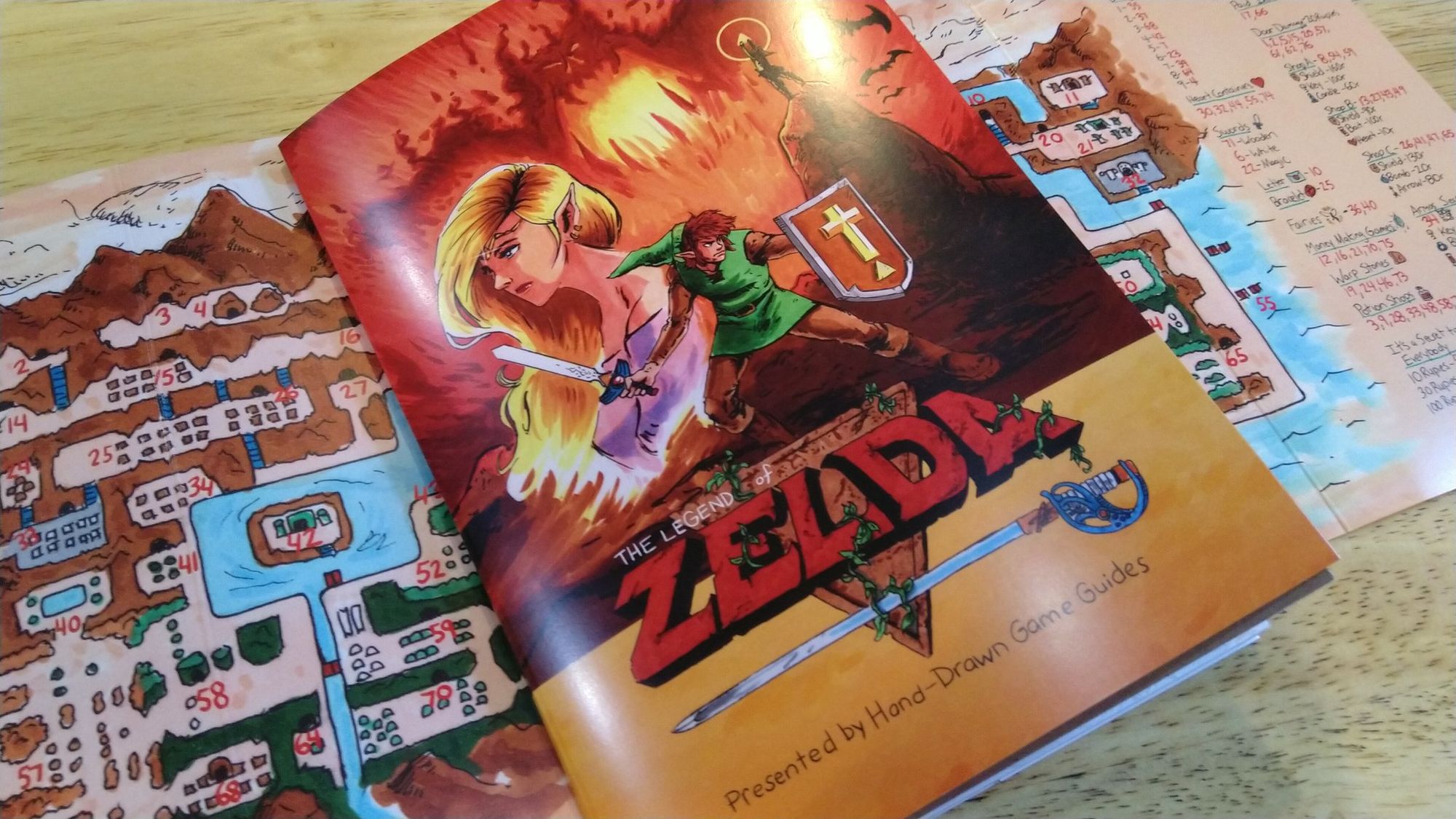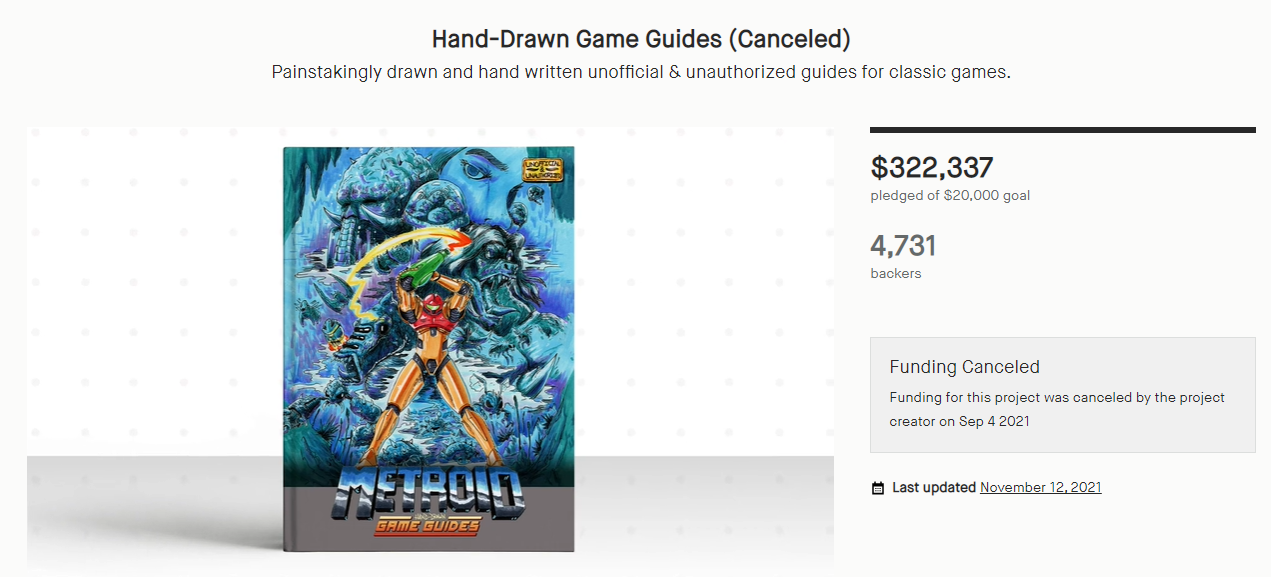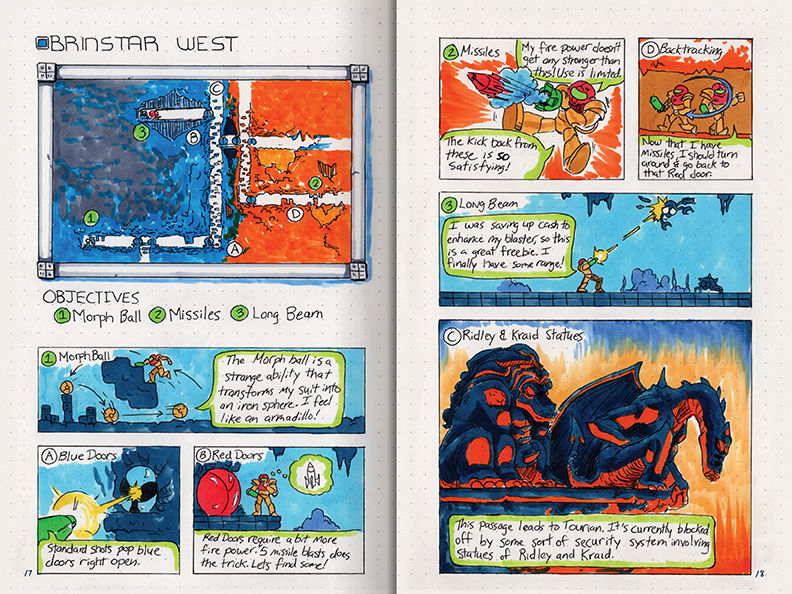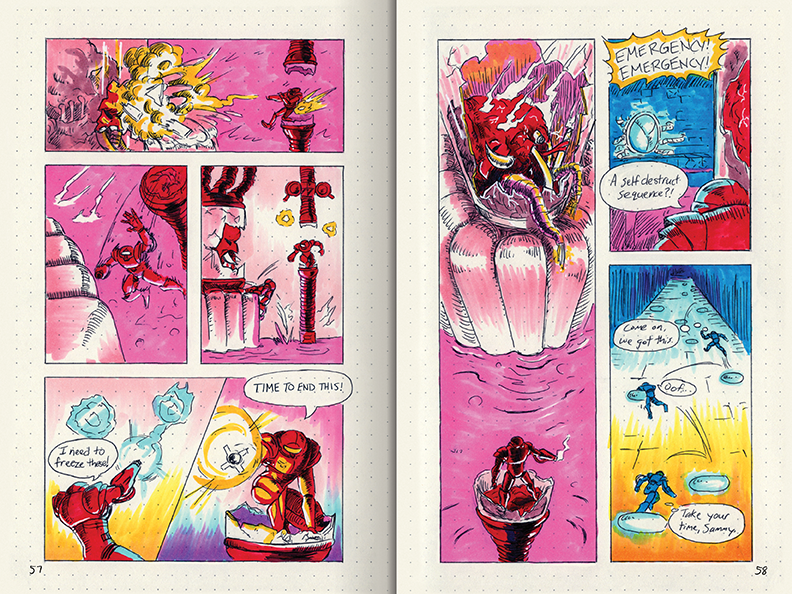One thing I did during the pandemic? I replayed the original Legend of Zelda. It’s something I’d been wanting to do even before “lockdowns” became a phrase I knew outside the context of American gun violence.
It wasn’t quarantine, however, that finally convinced me to take the 1985 classic for a fresh spin. It was Philip Summers’s Hand Drawn Game Guides. An artist and classic gaming enthusiast, Summers made a name for himself with a series of illustrated game guides.
Summers's guides were far removed from a simple FAQ, however. Every single thing in each book -maps, enemies, etc- were drawn by hand. They also added in elements like expanded story details, turning them into a gorgeous hybrid of walkthrough and graphic novel.
I learned about Summers’s work and thought his Zelda game guide would be perfect to help me enjoy a breezy run through of this old favorite. I was right! eBay connected me to a physical copy that became my stalwart companion on my revisit of Link’s first adventure.
It’s probably one of the best game books I’ve ever owned and it left me hungry for more! You can imagine my excitement when I learned Summers was launching a Kickstarter to provide exactly that.

A Kickstarter Campaign Derailed
In the autumn of 2021, Philip Summers decided to take his Hand Drawn series to a new level. He launched a Kickstarter aimed at funding the printing and publication of a new guide, based around the NES game Metroid.
Another classic Nintendo game, Metroid was originally released in 1987, spawned a still-running franchise, and remains a beloved classic among Nintendo fans.
The love that fans have for Metroid was evidenced in the rapid success of Summers’s Kickstarter campaign. His original Kickstarter goal was for $20,000. By the end of his 30-day campaign he had raised a whopping $322,337. I was one of the campaign’s backers.
Summers’s ambitions, unfortunately, were not to be. As his campaign neared its end, he was contacted by lawyers from “one of the game companies.” They claimed the project ran afoul of copyright laws.
“We did a standard 30-day campaign,” Summers explained, responding to my inquiries. “In the final 24 hours of the campaign I received an email saying that the Kickstarter had been copyright claimed and that there would be a discussion.”
While the promised “discussion” could have potentially worked out in Summers’s favor, the campaign’s ticking clock put him in a precarious situation.
“It was Saturday afternoon and the campaign ended on Sunday,” he said. “I knew that [Kickstarter] would not get the complaint until after the campaign had already ended.”
Kickstarter’s business model operates by taking a portion of the funds earned by its successful campaigns. If the campaign ended but a copyright claim prevented him from delivering the finished product, Summers would have to refund all of his backers. Kickstarter would not have refunded its earnings, leaving Summers on the hook for nearly $30,000 out of pocket.
“I was told to stop everything,” Summers said. Unable to afford the potential costs if he forged ahead, that’s exactly what he did.
Summers canceled his Kickstarter campaign and his Metroid game guide was halted in its tracks.

Not the First (And Not Likely the Last)
Summers’s Kickstarter isn’t the first project to fall prey to copyright issues like this. While his Hand Drawn Game Guide campaign is perhaps one of the more costly examples, Nintendo have a long history of threatening and closing down fan projects.
(Note: At no point in our conversations did Summers directly name Nintendo. I am making my own assumptions based on Nintendo’s ownership of Metroid.)
From free fan-made Pokemon MMORPGs to unofficial sequels and HD remakes, Nintendo’s legal team has never shied away from hitting people with copyright cease and desist orders. And they aren’t the only ones.
Copyright claims and full-on lawsuits are incredibly common in the video game industry, even between game developers themselves, and frequently for reasons that seem ridiculous to outsiders. In 2012, for instance, Bethesda and its parent company Zenimax sued Minecraft-maker Mojang, claiming Mojang’s game Scrolls was infringing on Bethesda’s Elder Scrolls trademark.
It was a move that was widely ridiculed at the time (and eventually ended in a settlement). The games were nothing alike. The worst part, however? Bethesda and Zenimax probably didn’t even really care all that much about Scrolls, at all.
The law is structured in such a way that failing to defend your trademark can threaten your ownership of it. In other words, even if Bethesda recognized how silly the whole affair was, they might have felt they had no choice but to sue or risk losing control of their own trademarks.
That same trademark issue can likely be blamed for situations like Summers’s canceled Kickstarter campaign. While it’s unlikely his Metroid guide book would cut into Nintendo’s profits, its crowdfunding success made it a prime target for the company’s legal team.
“They are extremely protective of their properties and rightfully so,” said Summers. “I cannot blame them in the slightest.”
Even so, there’s no denying that situations like Summers’s Kickstarter can feel frivolous and inconsistent.
Summers released three of his guides prior to his Kickstarter without issue. He’s also far from the only fan out there making and selling products based on old Nintendo games. Nintendo doesn’t go after all of them and, in actuality, there are laws potentially protecting fan creators from the sorts of issues that derailed Summers’s project.
“I've spoken with lawyers since the campaign ended and they seem to think I could moved ahead with Hand Drawn Game Guides and that I'd have a case if I ever went to court,” Summers said.
Even if individuals like Summers do have a case, however, the prospect of taking on a business the size of Nintendo isn’t something that many creators relish.
“I [wasn’t] willing to go through that,” Summers explained. “At the end of the day I just wanted to make something cool that people liked.”

Their Biggest Fans
It goes without saying that you don’t start a project like Hand Drawn Game Guides on a whim. Works like that are born from a place of genuine love and admiration. That sort of admiration is what inspired Philip Summers.
“I have a lifetime of memories attached [to Nintendo],” said Summers. “I absolutely love their games.”
Creators like Summers are some of the biggest fans there are, willing to commit their time and efforts in ways that others would balk at. That fact is part of what makes the actions of companies like Nintendo so intensely frustrating to watch.
Nintendo, in the current video game market, is riding as high as it ever has. The Nintendo Switch is one of the best-selling consoles of all time and remains in high demand, even with more powerful competitors entering the market.
It hasn’t always been that way, though. I’ve lived through times when Nintendo’s products have floundered, struggled, and failed. The Nintendo Switch was preceded by the WiiU, easily one of the biggest flops in the company’s history. Consoles like the Nintendo 64 and the GameCube were likewise overshadowed by more successful competitors. There were long years where some questioned the very relevance of Nintendo in the modern games industry.
Fans like Summers are the sort who have kept Nintendo alive in its harder times. They’re also some of the best ambassadors for fledgling fans interested in taking first steps into new games.
I’d never played a Metroid game before I backed Summers’s Metroid guide on Kickstarter. After the great experience I had using his Zelda guide, I had hoped his Metroid book could be my gateway into another Nintendo franchise. I’ve always heard great things about it, after all!
Those ambitions fizzled out after Summers’s Kickstarter was canceled. I still haven’t played more than five minutes of a Metroid title to date. I wonder if I would have bought Metroid: Dread last year if I’d gotten hooked on the franchise like I planned. Nintendo’s actions, in the least, prevented one person from getting more invested in their franchises.
The Quandary of Nostalgia
Nobody has any illusions about the fact that Nintendo is a business. They’re one of those businesses, though, with the luck to occupy a place of prominence in peoples’ hearts and minds. Entire generations grew up enamored with the adventures of characters like Mario, Link, and Samus. Many of us have children who are growing up with those same characters today.
On the one hand, that means that people like me will probably always have a soft spot for Nintendo. I’m definitely one of those grown thirty-something men who watches with bated breath to see what’s announced whenever there’s a new Nintendo Direct.
On the other hand, however, my affection for this massive company also means that its less savory moves feel doubly disappointing. It’s never fun to look at an entity that’s brought you so much joy and think, “They did something wrong here.”
I can only imagine how creators like Philip Summers have to feel - putting their own love and passion to work, just to hear “cease and desist.” It’s hard not to wonder if there’s a better way to handle these sorts of issues. It’s not hard to imagine how Nintendo (and all the others) could treat fans like Philip Summers with more respect.
Note: I attempted to reach out to Nintendo of America for a comment about this story. I waited several weeks without response before moving forward with its publication.

